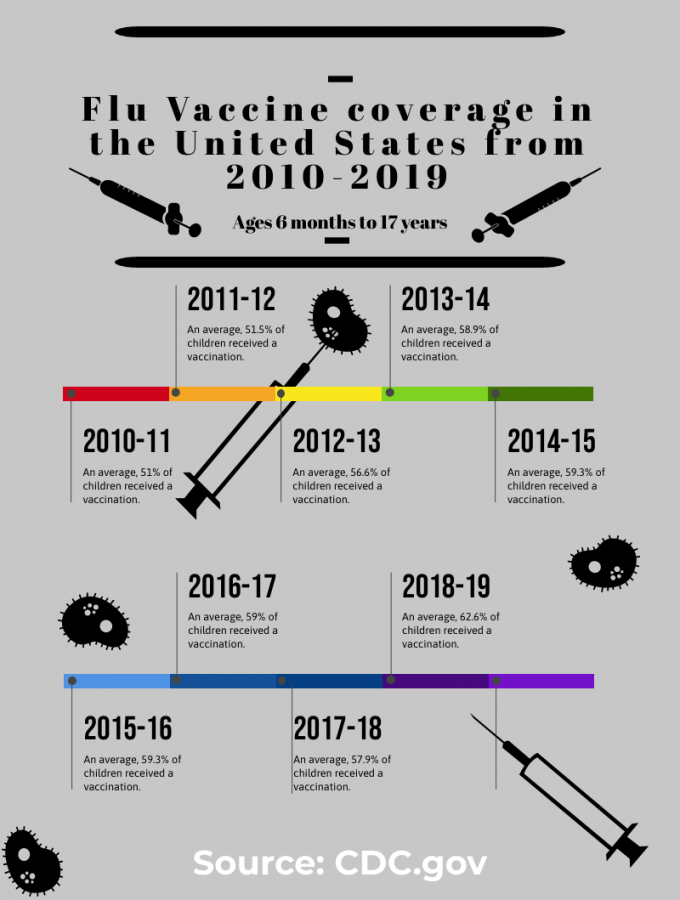Vaccinations: needed more than ever
Ignoring vaccines does more harm than good
Infographic by Alexis Bahensky
Though vaccination use has been on the rise in the past decade, a little less than half the population still refuses to receive them.
August 27, 2020
During the 2018-19 flu seasons, a study conducted by the CDC showed that on average only 62.6% of children 17 and under were vaccinated. That leaves 47.4% unvaccinated and more susceptible to infections and diseases. Going into 2020 a new pandemic made its way into the US. This disease is known as COVID-19, and because of this new arrival to our states, it is more imperative than ever to use vaccinations.
When faced with a controversial idea, people tend to only look toward the negatives the other side holds. The only negative consequence people will face during a vaccination is a sore arm afterward, which isn’t a large concern. What is, however, is the Coronavirus.
Some people aren’t getting vaccinations because they don’t help against COVID. That is just not true. While there has been no vaccine released to the public for COVID, a flu shot along with other vaccines can help minimize the chances of catching this new virus.
People are going to wonder why getting a flu shot would help fight against the coronavirus. It’s easy; it builds up the body’s immunity towards other diseases. According to the CDC, when your body is in healthy condition, it’s more likely to ward off an unknown disease more efficiently than if you catch a known one at the same time. Since the body has dealt with one of those diseases before, the white blood cells are more likely to attack that disease first to get it out of the body. However, that leaves the other invader more time to spread throughout the body, causing more damage to the immune system.
Not only does it affect a person’s health, but their work or school life can pay the price as well. A study provided by the National Foundation of Infectious Diseases showed that the average flu can cause someone to miss, on average, 15 workdays. Hepatitis can cause a month’s loss of work. This can potentially lead to a lot of stress. Not only do you have to make up the work that was missed, but more work is piled up on top of that.cI only missed, at most, three days of school at one time and that caused me major stress. It’s hard to imagine being set back a whole month.
Vaccine preventable diseases have been on the decline in the United states for years. Though that may be true, many other areas, such as developing countries, don’t have the resources the US has. The CDC has recently released that a measles outbreak happened around the same time the COVID outbreak came to the states. This mainly occurred because of out-of-country travel. Just because a virus may not be evident in one place doesn’t mean it can’t be brought back from another. Those who refuse to get the vaccine are at a much higher risk than those who decided to get theirs.
The overall main reason people, especially parents, are hesitant to vaccinate themselves and their children is that they don’t understand the science behind vaccinations. According to The U.S. Department of Health and Human Services, it takes years of study and testing to conclude that a vaccine is ready to be safely used. Vaccines are tested in a group of volunteers, where they study what amount is best to use and how it affects the human immune system.
Even when given information regarding vaccine safety, there are always going to be anti-vaxxers. A few large rumors have surfaced during the past couple of years regarding why parents shouldn’t get their children vaccinated.
The first and most popular rumor is that a vaccine can give a child autism. A shot that is designed to stop diseases can not give someone a genetic disorder. It is just not possible. According to the Children’s Hospital of Philadelphia, it has been proven that getting a vaccine will not give a child autism. Researchers have concluded that a study led by an English scientist, Andrew Wakefield, was flawed when testing the theory. He tested children who had received the MMR, a vaccine that prevents measles, mumps and rubella, at the same age most were diagnosed with autism. Symptoms were also observed after the tests were run, not before, so the study is unreliable. The theory has been debunked since then.
The second rumor that has spread is that vaccines can give you a virus. As stated by NFID, the CDC and many other medical institutions, most contain the killed virus which makes it impossible for it to invade the body. Others contain a weakened virus, and though the virus is still alive, it has been forced to a state where it is incapable of giving someone the virus. If the disease has no strength to invade, there will be no virus.
Getting a vaccination can only do someone good. People do more harm when they refuse to receive them. They are more important than ever, especially in a time of a worldwide pandemic.







